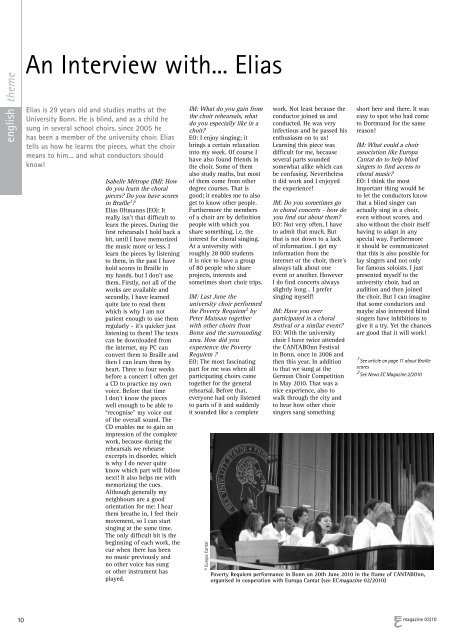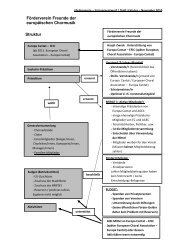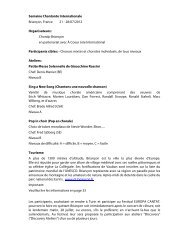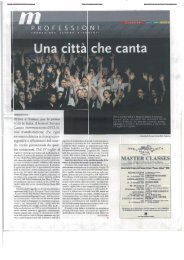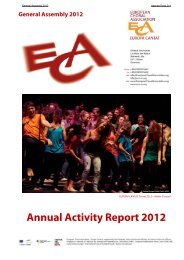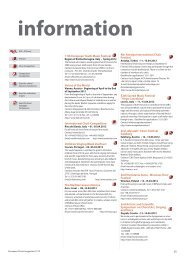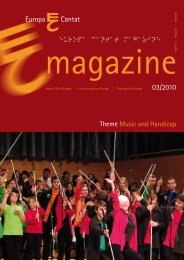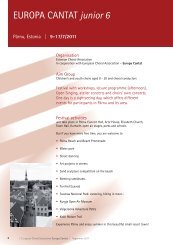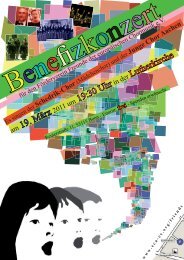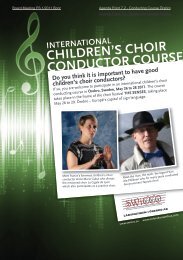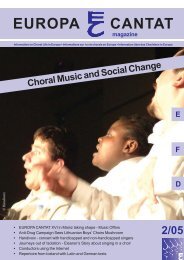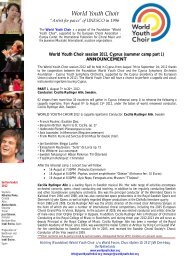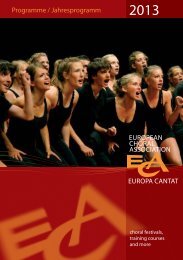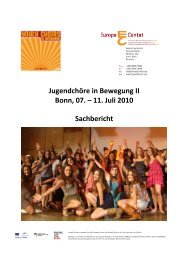Music and Handicap (Europa Cantat Magazine 03/2010) - European ...
Music and Handicap (Europa Cantat Magazine 03/2010) - European ...
Music and Handicap (Europa Cantat Magazine 03/2010) - European ...
You also want an ePaper? Increase the reach of your titles
YUMPU automatically turns print PDFs into web optimized ePapers that Google loves.
english theme<br />
10<br />
An Interview with... Elias<br />
Elias is 29 years old <strong>and</strong> studies maths at the<br />
University Bonn. He is blind, <strong>and</strong> as a child he<br />
sung in several school choirs, since 2005 he<br />
has been a member of the university choir. Elias<br />
tells us how he learns the pieces, what the choir<br />
means to him… <strong>and</strong> what conductors should<br />
know!<br />
Isabelle Métrope (IM): How<br />
do you learn the choral<br />
pieces? Do you have scores<br />
in Braille 1 ?<br />
Elias Oltmanns (EO): It<br />
really isn’t that difficult to<br />
learn the pieces. During the<br />
first rehearsals I hold back a<br />
bit, until I have memorized<br />
the music more or less. I<br />
learn the pieces by listening<br />
to them, in the past I have<br />
hold scores in Braille in<br />
my h<strong>and</strong>s, but I don’t use<br />
them. Firstly, not all of the<br />
works are available <strong>and</strong><br />
secondly, I have learned<br />
quite late to read them<br />
which is why I am not<br />
patient enough to use them<br />
regularly - it’s quicker just<br />
listening to them! The texts<br />
can be downloaded from<br />
the internet, my PC can<br />
convert them to Braille <strong>and</strong><br />
then I can learn them by<br />
heart. Three to four weeks<br />
before a concert I often get<br />
a CD to practice my own<br />
voice. Before that time<br />
I don’t know the pieces<br />
well enough to be able to<br />
“recognise” my voice out<br />
of the overall sound. The<br />
CD enables me to gain an<br />
impression of the complete<br />
work, because during the<br />
rehearsals we rehearse<br />
excerpts in disorder, which<br />
is why I do never quite<br />
know which part will follow<br />
next! It also helps me with<br />
memorizing the cues.<br />
Although generally my<br />
neighbours are a good<br />
orientation for me: I hear<br />
them breathe in, I feel their<br />
movement, so I can start<br />
singing at the same time.<br />
The only difficult bit is the<br />
beginning of each work, the<br />
cue when there has been<br />
no music previously <strong>and</strong><br />
no other voice has sung<br />
or other instrument has<br />
played.<br />
IM: What do you gain from<br />
the choir rehearsals, what<br />
do you especially like in a<br />
choir?<br />
EO: I enjoy singing; it<br />
brings a certain relaxation<br />
into my week. Of course I<br />
have also found friends in<br />
the choir. Some of them<br />
also study maths, but most<br />
of them come from other<br />
degree courses. That is<br />
good; it enables me to also<br />
get to know other people.<br />
Furthermore the members<br />
of a choir are by definition<br />
people with which you<br />
share something, i.e. the<br />
interest for choral singing.<br />
At a university with<br />
roughly 28 000 students<br />
it is nice to have a group<br />
of 80 people who share<br />
projects, interests <strong>and</strong><br />
sometimes short choir trips.<br />
IM: Last June the<br />
university choir performed<br />
the Poverty Requiem 2 by<br />
Peter Maissan together<br />
with other choirs from<br />
Bonn <strong>and</strong> the surrounding<br />
area. How did you<br />
experience the Poverty<br />
Requiem ?<br />
EO: The most fascinating<br />
part for me was when all<br />
participating choirs came<br />
together for the general<br />
rehearsal. Before that,<br />
everyone had only listened<br />
to parts of it <strong>and</strong> suddenly<br />
it sounded like a complete<br />
© <strong>Europa</strong> <strong>Cantat</strong><br />
work. Not least because the<br />
conductor joined us <strong>and</strong><br />
conducted. He was very<br />
infectious <strong>and</strong> he passed his<br />
enthusiasm on to us!<br />
Learning this piece was<br />
difficult for me, because<br />
several parts sounded<br />
somewhat alike which can<br />
be confusing. Nevertheless<br />
it did work <strong>and</strong> I enjoyed<br />
the experience!<br />
IM: Do you sometimes go<br />
to choral concerts - how do<br />
you find out about them?<br />
EO: Not very often, I have<br />
to admit that much. But<br />
that is not down to a lack<br />
of information. I get my<br />
information from the<br />
internet or the choir, there’s<br />
always talk about one<br />
event or another. However<br />
I do find concerts always<br />
slightly long… I prefer<br />
singing myself!<br />
IM: Have you ever<br />
participated in a choral<br />
festival or a similar event?<br />
EO: With the university<br />
choir I have twice attended<br />
the CANTABOnn Festival<br />
in Bonn, once in 2006 <strong>and</strong><br />
then this year. In addition<br />
to that we sung at the<br />
German Choir Competition<br />
in May <strong>2010</strong>. That was a<br />
nice experience, also to<br />
walk through the city <strong>and</strong><br />
to hear how other choir<br />
singers sang something<br />
short here <strong>and</strong> there. It was<br />
easy to spot who had come<br />
to Dortmund for the same<br />
reason!<br />
IM: What could a choir<br />
association like <strong>Europa</strong><br />
<strong>Cantat</strong> do to help blind<br />
singers to find access to<br />
choral music?<br />
EO: I think the most<br />
important thing would be<br />
to let the conductors know<br />
that a blind singer can<br />
actually sing in a choir,<br />
even without scores, <strong>and</strong><br />
also without the choir itself<br />
having to adapt in any<br />
special way. Furthermore<br />
it should be communicated<br />
that this is also possible for<br />
lay singers <strong>and</strong> not only<br />
for famous soloists. I just<br />
presented myself to the<br />
university choir, had an<br />
audition <strong>and</strong> then joined<br />
the choir. But I can imagine<br />
that some conductors <strong>and</strong><br />
maybe also interested blind<br />
singers have inhibitions to<br />
give it a try. Yet the chances<br />
are good that it will work!<br />
1<br />
See article on page 11 about Braille<br />
scores<br />
2<br />
See News EC <strong>Magazine</strong> 2/<strong>2010</strong><br />
Poverty Requiem performance in Bonn on 20th June <strong>2010</strong> in the frame of CANTABOnn,<br />
organised in cooperation with <strong>Europa</strong> <strong>Cantat</strong> (see ECmagazine 02/<strong>2010</strong>)<br />
magazine <strong>03</strong>/10


